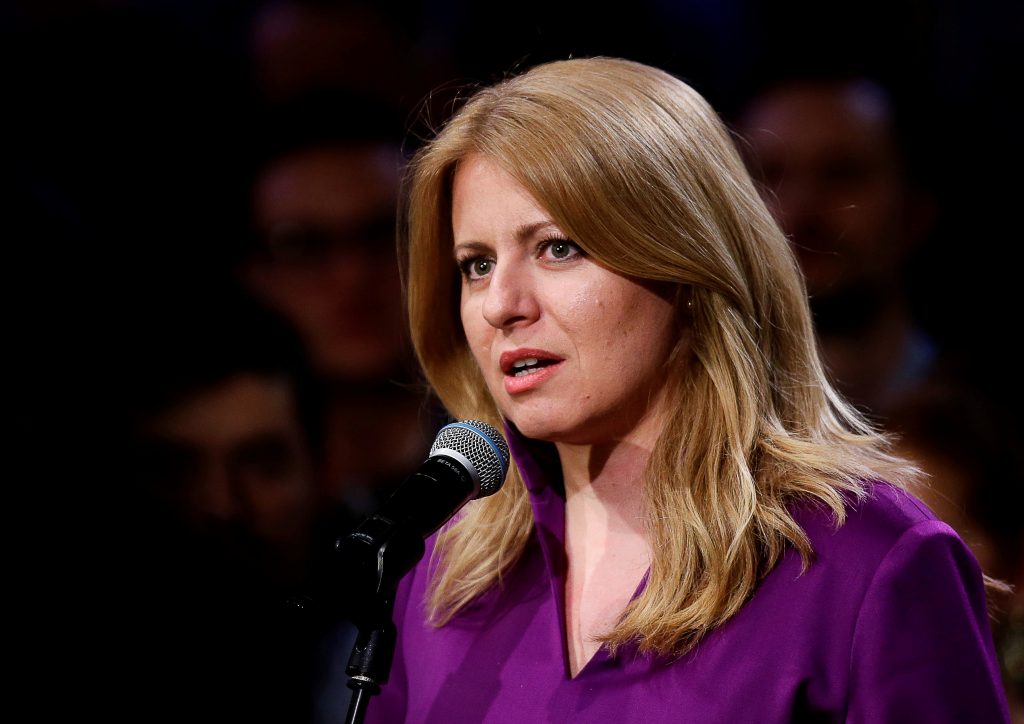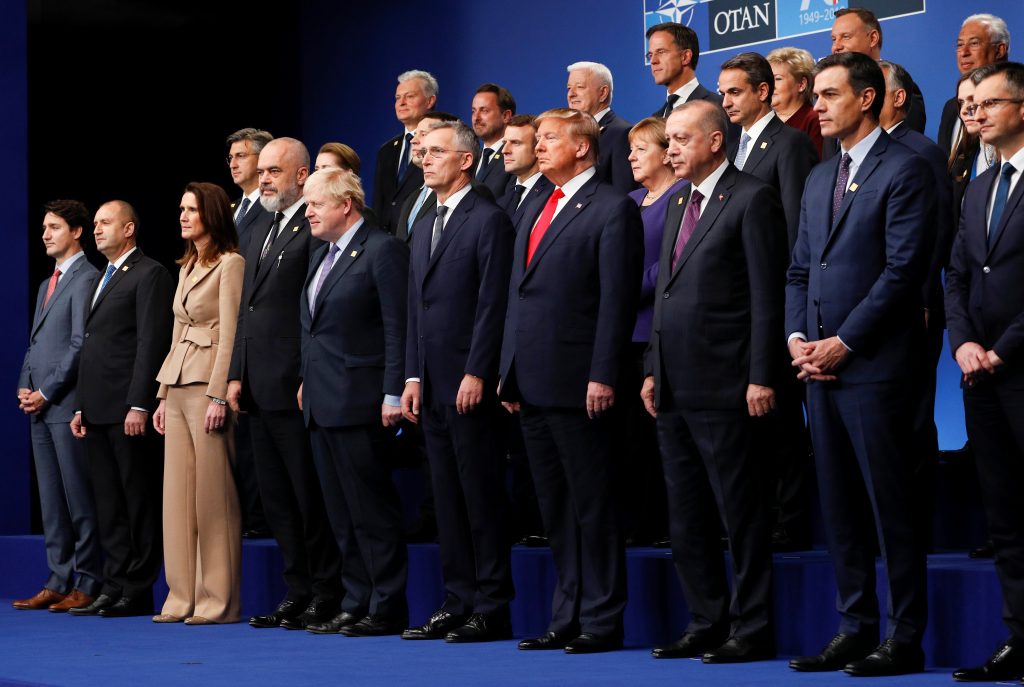by Frederick Kempe
China has emerged as the most formidable challenge that has ever faced NATO. That is true as well for the North American and European economies upon which NATO rests, which account for roughly half of global GDP.
Lay aside all the theatrics of this week’s 70th anniversary summit of NATO now-29 members. The biggest news – though woefully underreported – was that NATO, history’s most enduring and successful alliance, for the first-time defined China as a strategic challenge.
That news was drowned out by French leader Emmanuel Macron, who came into town having declared NATO brain dead; by Turkish leader Recep Tayyip Erdoğan, who responded that it instead was the French leader’s brain that was lifeless; by Canadian leader Justin Trudeau, who was caught mocking President Trump during allied cocktail hour; and by President Trump, who shrugged in response that the Canadian was two-faced.
As entertaining as all that was, more significant was that NATO allies have belatedly focused on the most significant challenge to world democracies and their market-driven economies in our new era of major power competition. However, although the closing NATO summit statement required unanimity, even more revealing is the ambiguity of its language, reflecting disagreement over whether Beijing is more of an economic opportunity than fundamental challenge.
“We recognize that China’s growing influence and international policies present both opportunities and challenges that we need to address together as an alliance,” it said.
That’s soft stuff considering that this authoritarian, state capitalist country has already become a global center of gravity – the world’s largest by population, ranking second only to the United States in military spending and, depending on what measure you like, is already or will soon be the largest economy on Earth.
Get the Inflection Points newsletter
Subscribe to Frederick Kempe’s weekly Inflection Points column, which focuses on the global challenges facing the United States and how to best address them.
The language was also muted compared to new outrage and legislative action in the United States and elsewhere regarding the reported repression of China’s Uighur Muslim minority, following weeks of Hong Kong protests and local elections supporting their cause, and in the face of continued concerns regarding Huawei’s 5G telecom dominance.
One also didn’t have to look far in the news this week to see new evidence of China’s growing partnerships with Russia, NATO’s primary focus for many years, ranging from a new 1,800 mile-long gas pipeline connecting both countries, to Huawei’s expanded relations with at least eight top Russian universities and research institutes.
Writing for Defense One, the Atlantic Council’s Barry Pavel and Ian Brzezinski have usefully called upon NATO to create a NATO-China Council that would collectively engage China on areas of concern. It would be a structural mechanism for dialogue with Russia to raise concerns, avoid misunderstandings and, where possible, foster cooperation.
The list of matters it would deal with is already a lengthy one, write the authors: Huawei’s targeting of European and North American digital infrastructure; increasing ownership of major European seaports critical to NATO; joint exercises with the Russian military, including in the Nordic-Baltic region; and cyber espionage and intellectual property theft.
A London financier friend, who has enough business in China to remain anonymous, lays out the case for why democracies around the world need to get their act together soon to address [Beijing’s] still-underestimated challenge.
Over time, he argues, China will have the largest human, economic and technological resources of any single country.
“The government has more successfully fostered economic development in a strategic fashion than any other communist or totalitarian regime in history,” he says, “successfully managing the tension (so far) between central control and harnessing the power of capitalist and market-based incentives and structures. Rising per capital incomes and the power of compounding means it will become the largest economy on the planet. Period.”
Nothing could be more confounding for those who thought history had determined that democratic rule was the flavor of the future. Unlike previous communist and authoritarian states, China has combined political control with innovation and development resulting from decentralized markets. In startling manner, China has managed to become a technological leader as well, and its closed system is feeding its advancement using big data and Artificial Intelligence.
“China has been smart about building strength without projecting strength,” says my London financier friend. “Many of its totalitarian predecessors lacked that discipline. And it will likely continue. It can further its rise until the discipline is no longer required.”
At that point, he reckons it will all become about one thing: what is China’s intent and how will it use its power. On this point, it would be unlikely to foster freedom of speech, dissent and discourse, rule of law, or democratic elections and decision making – everything NATO was created to defend.
So, it then comes down to degrees and modes of conflict or competition, which is what a concerted Western strategy would be designed to discuss and steer.
If you play the world forward, the resources still available to the US and its allies are formidable. They include the global financial system and the world’s reserve currency, which is critical to maintain. The U.S. also has the world’s most advanced innovation engine, though that’s no longer secure.
The NATO summit was also a good reminder of the value in pooled resources, not just for military purposes but perhaps more importantly to promote economic strength. However, at a time when unity of purpose is most required, new trade skirmishes broke out last week with Brazil, Argentina and with France.
History may still force transatlantic allies together to better manage China’s rise collectively. During the last world leadership transition, common Western purpose was less necessary because the US was displacing the United Kingdom, and both had similar value systems. As China rises, common purpose among Western allies will be more crucial.
Hong Kong protests have been a useful reminder that human desire for freedom is universal. Pluralism and democracy have proven to be the most resilient systems over time. Yet even optimists have got to worry about the costs of mismanaging this period of history.
It’s a good thing that NATO called out the challenge this week. Now alliance leaders should replace mocking and name calling with strategic planning and purpose.
This article originally appeared on CNBC.com.
Frederick Kempe is president and chief executive officer of the Atlantic Council. You can follow him on Twitter @FredKempe.
Must reads from a world in transition
 FILE PHOTO: Slovakia’s presidential candidate Zuzana Caputova speaks at her party’s headquarters in Bratislava, Slovakia, March 30, 2019. REUTERS/David W Cerny/File Photo
FILE PHOTO: Slovakia’s presidential candidate Zuzana Caputova speaks at her party’s headquarters in Bratislava, Slovakia, March 30, 2019. REUTERS/David W Cerny/File Photo
1. TRUMP’S TARIFF ERUPTION
The Editorial Board / The Wall Street Journal
The Wall Street Journal editorial page – usually a cheerleader for Republican economic policies – has been consistent in its take-down of President Trump’s approach to tariffs. This week, it questioned his legal authority as he hit Brazil and Argentina on national security grounds.
“As he negotiates with China,” says the Wall Street Journal, “the President should be building trade alliances with the rest of the world and reducing protectionist fears. Instead he uses tariffs as a coercive tool at any time for any reason even against friends who have acted in good faith.” Read More →
2. THE CHINA CHALLENGE
Fareed Zakaria delivers one of the most comprehensive, thoughtful and reasonable reflections on how the United States should think about and manage China’s rise in the newest edition of Foreign Affairs.He draws upon the history of other power transitions and the unique nature of this one.
The piece navigates an intelligent course that steers away from panic while understanding the fundamental nature of the challenge.
“Let’s be clear: China is a repressive regime that engages in thoroughly illiberal policies, from banning free speech to interning religious minorities,” he writes. “Over the last five years, it has intensified its political control and economic statism at home. Abroad, it has become a competitor and in some places a rival of the United States. But the essential strategic question for Americans today is, Do these facts make China a vital threat, and to the extent that they do, how should that threat be addressed?”
And elsewhere…
“The old order—in which small European countries act as global heavyweights while behemoths such as China and India are excluded from the first ranks of global institutions—cannot be sustained. China will have to be given a place at the table and genuinely integrated into the structures of decision-making, or it will freelance and unilaterally create its own new structures and systems. China’s ascension to global power is the most significant new factor in the international system in centuries. It must be recognized as such.” Read More →
3. BRITISH ELECTION COUNTDOWN
Gerard Baker / The Wall Street Journal
Hold onto your seats for this week’s historic elections in the United Kingdom, for which Gerry Baker in the Wall Street Journal provides the most useful and readable curtain raiser on the cover of this weekend’s Review section.
The two most likely outcomes, he writes, are that the Conservatives and Boris Johnson win an outright majority, which notoriously unreliable polls suggest, “allowing him to secure Brexit legislation that will see the U.K. leave the EU early in the new year.”The alternative is an opposition victory that likely would lead to a second referendum that would cancel Brexit or introduce a softer version sometime in 2020.
Yet Baker argues this about more than the UK: “It’s a defining moment in the development of modern Western politics, a potentially pivotal event in the age of populism, with ramifications that go beyond British shores.” Read More →
4. “A RAY OF HOPE” IN SLOVAKIA
If you’re looking for a dose of optimism in European politics, read Masha Gessen’s New Yorker profile of Zuzana Caputova, who was elected last spring as the President of Slovakia as a voice of reason “in a sea of demagoguery.”
The pivotal moment in her campaign came when asked about her view of adoption of children by same-sex couples, a third-rail issue in one of the six countries in the European Union that doesn’t allow such marriages or adoption. She said though being raised by biological parents was ideal, any two loving parents were better than an orphanage.
She won, argues Gessen, not because a critical mass of voters agreed, “but because of her honesty and openness, and perhaps her willingness to reason in public, appealed to them.”
5. FUTURE SHOCK IN CHINA
Sui-Lee Wee and Paul Mozur / The New York Times
This week’s two must-reads circle around the potential for abuse of biological science in China – or, for that matter, in any country that lacks sufficient checks and balances.
The first comes in the MIT Tech Review, a disturbing look at excerpts from a previously unpublished manuscript “describing the creation of the first gene-edited babies, born last year in China.” Antonio Regalado turns to four experts to help him navigate “one of the most important public interest issues of all time – the ability to change human heredity using technology.” Read More →
New York Times’ reporters Sui-Lee Wee and Paul Mozur look at how Chinese scientists are trying to find a way to use a DNA sample to create an image of a person’s face. The same technology is being developed in the United States and elsewhere, but the authors worry about the potential uses in the Xinjiang region, with a million or more ethnic Uighurs and other Muslim minority groups. Read More →

No comments:
Post a Comment